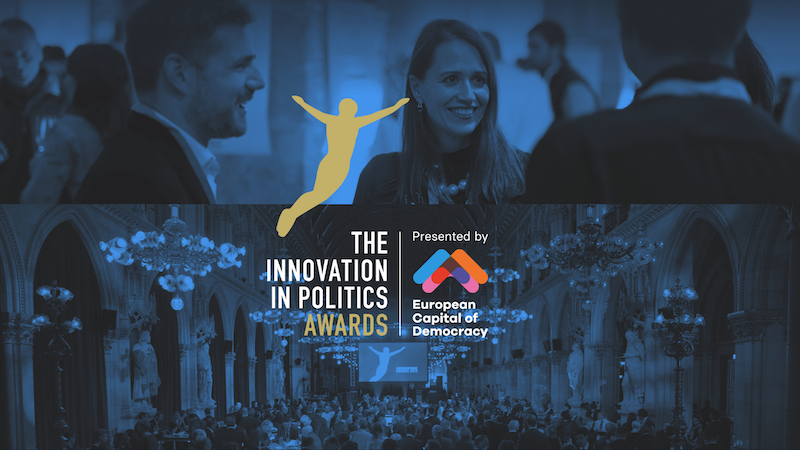Our dedicated Innovation in Politics Awards community taught us, along the last five years, that political innovation is a multi-faceted organism that thrives on the cusp of challenge, and is set into motion through many different levels of localized change-making, policy-making, cross-border exchange, creativity and grit. Our finalists, winners and associated programmes members are the ones who connect all those elements into powerful tools which have become tried and tested best practices in politics that we are proud to have collected in our ever-growing Showroom.
That’s why we invited eleven innovation-driven project owners, local changemakers and best practice creators to share their views on what constitutes political innovation today.
We hope their answers inspire you to take part in the 2021 edition of The Innovation in Politics Awards; be it as a juror, by nominating or submitting a project. Because only then will we be able to continue to celebrate and honour the projects that contribute to political innovation today – and tomorrow!
Philippe Narval, Author of Die freundliche Revolution, speaker and former Secretary General of the European Forum Alpbach
“Over decades we thought that politics is static. We saw no need to change a “winning system”, especially after the collapse of the iron curtain had shown the supposed superiority of the western, liberal model. We were wrong! With massive technological, geopolitical and ecological change on its way, democracies are in great need to innovate in order to remain true to their core values: freedom, equality and solidarity.
What if in the process of such innovation we started to regard the know-how and experience of ordinary citizens as a valuable resource? A resource for change, bottom-up solutions and self-organization. Just calling people to attend elections every 4-5 years is not enough. Politics can and should do more to reach out. The Covid-19 pandemic showed once for all, how wrong the neoliberal credo of a weak executive, public administration was. We now have an opportunity to rebuild Europe’s public institutions. Let’s do this not along the 19th century hierarchical model, but based on an agile, collaborative and mission-oriented one. Luckily many democratic and political innovations use a citizen-centred approach. The “Innovation in Politics Award” offers a treasure chest of examples which show new methods of engaging citizens. One of the award winners, Axelle Lemaire, initiated the largest participatory lawmaking project as then minister for digital affairs in France. Another nominee, Ireland trialed citizens assemblies. This model of lot-based councils advising parliaments on policy and reforms too is making progress all across Europe. These are just two examples of many proving that innovation is indeed feasible in political systems once thought static. Spread the word!”
Roland Hackl, Project Manager tbw research
Winner of the 2020 Innovation in Politics Awards with the project RemiHub
“Anything that contributes to solving a problem is innovation. That can be rethinking stakeholder roles, rethinking how to shape governance, how to shape framework conditions. These are actually the innovations that, in my opinion, really bring about change.
For example, if you look at what has been done in Vienna in recent years for resilience against climate change. The ideas were not new: planting trees, vertical gardening, cool streets … but the administrative-political setting that made these measures possible was innovative. For me, innovation in governance is the level of action if you are interested in results and not in innovation as an end in itself.”
Matúš Vallo, Mayor of Bratislava
Winner of the 2020 Innovation in Politics Awards with the project Home Quarantine without a Home
“I think about the word innovation a lot. Because the things which are innovative for us may be an old song for somebody else. Many things we have been doing for years can be completely new for somebody else. Innovation in my context is doing things in another way, thinking out of the box. Trying to follow a completely different approach and asking completely new and different questions than before. Because when we are always asking the old questions in the same way with the same topics, we always have the same answers. So that’s innovation for me.”
Yulia Grechka, Head of the Board of CSO Anti-corruption Headquarters
Winner of the 2020 Innovation in Politics Awards with the project Map of Repairs
“For me, innovation is very important and maybe I don’t have any education in technologies, but I have partners, a team of developers through my native city and we work with them. And for me innovation is the way to reach every house, in every city, in every corner in our country, because Ukraine is a huge country. But by using the Internet and innovative tools, you can get everywhere and communicate with people in every city, even in very small villages, and innovation creates very good opportunities for the anti-corruption movement because of that. Now I work with other projects about conflicts of interests of civil servants and deputies and mayors of Ukraine. You can just check; the system does automatically show who is lobbying for the interest of their companies or of their relatives and friends. It is also an anti-corruption tool. And now we are developing this tool and I think we will send information about this tool to your competition, too.”
Ilhan Kyuchyuk, MEP, President of the Youth Movement for Rights and Freedoms (Bulgaria)
Finalist of the 2017 Innovation in Politics Awards with the Project Res Exposures prepared by the children of Sevlievo
“We need strong innovation in politics because I see it as a visionary exercise. If we want to go forward with our plans, we certainly need a strong vision which can only be built on democracy, respecting human rights, respecting each other’s opinion, unity, and diversity, with strong participation of the citizens to constantly create this environment of democratic legitimacy.”
Paulina Fröhlich, Head of the Programme “Future of Democracy”, Das Progressive Zentrum
“I usually look at innovation in politics from a normative perspective: what brings progress, i.e. positive development for society without harm? Innovation in politics should therefore grow out of an understanding of a problem and be built out of courage, creativity and sensitivity. Several exchange programmes between European administrations, for example, came into being because there was previously little knowledge transfer, little room for inspiration of work processes, or little European thinking in following what were actually European rules. Working in an administration was seen as something very settled. It was (and is) certainly not easy to organise support for such an exchange programme, but many administrations are already doing it, innovating bureaucracy for the better. Innovations in policy should always benefit people, take the environment into account, and be open to new thinking.”
Chris Hildrey, Architect
Winner of the 2020 Innovation in Politics Award with his project ProxyAddress
“I think innovation in itself isn’t really the important thing. It is the capacity for innovation, right? You can’t decouple luck and preparation. If some fortunate opportunity comes along and you are not prepared for it, that’s not a fortunate opportunity anymore because you can’t take advantage of it. Innovation is being equipped to see an idea forwards. At conferences or seminars about “How do we get innovation?”, innovation is often talked about as if it is some golden nugget in the ground. But innovation is not a means and an end in itself. It is a symptom of a wider set of preparation and approaches. And for me this includes being able to follow the problem, not the solution. Because very often, people will think of a solution and then find any way possible to make that solution work. Whereas actually it’s about the problem that is being tackled. Innovation is the toolkit that enables you to pursue fixing the problem because it means that you can be adaptable. It means you can lend your hand to where it needs to go and that you retain the fidelity of the very spirit of the original idea through what can otherwise be a very very obstructed pathway.”
Renato Galliano, Director of Urban Economy and Employment, City of Milan
Winner of the 2019 Innovation in Politics Award with FabriQ – The Social Enterprise Incubator
“When I talk about innovation, I don’t talk about technology. I talk about new ways of experimenting with things, new ways of policies and projects in our city. If we don’t experiment with new ways of doing things, we won’t be able to achieve interesting results. It is something that pushes us to be more resilient, able to answer and to adapt our actions to new problems. And the Covid experience showed that we have to be resilient and able to change our actions in a very short period of time.”
Edoardo Caroli and Ilario Salvemini, founders of Turbe Giovanili and members of the ACT NOW Youth Network
“Innovation in politics is allowing youths to represent themselves in local, national and European institutions and confront contexts in original ways aimed at improving the system currently in place. Our political campaign in Ravenna will be based on this approach. Youths contributing together for a shared goal: making our voice louder and louder. Innovation is the result of youths becoming actively engaged in what makes them feel passionate, and can have several forms by exploiting the means available or by creating new ones. Innovation is grouping youths’ voices under a single umbrella to make them sound louder and stronger. Youths are the synonym of innovation.”
Zahraa Issa, co-founder of Locate Victims Beirut and member of the ACT NOW Youth Network
“To me, innovation in politics is any effort aiming to make politics less elitist. More accessible to the general population, much easier to understand, break down and keep up with. It really is telling that people who are remotely ‘political’ or up to date with anything going on are seen as smart and outspoken. Being politically well-versed should be a norm. What is being debated inside parliamentary and assembly halls is our education, healthcare, right to vote, the fate of our incarcerated people, our refugees, quite literally, the course of our lives.
Being removed from that is nothing short of dangerous for our collective wellbeing.”
What about you? How would you define political innovation?
If these statements sparked your interest, please find all necessary information about joining the citizens’ jury and the Awards process here.
*The above answers have been edited for clarity and conciseness.



